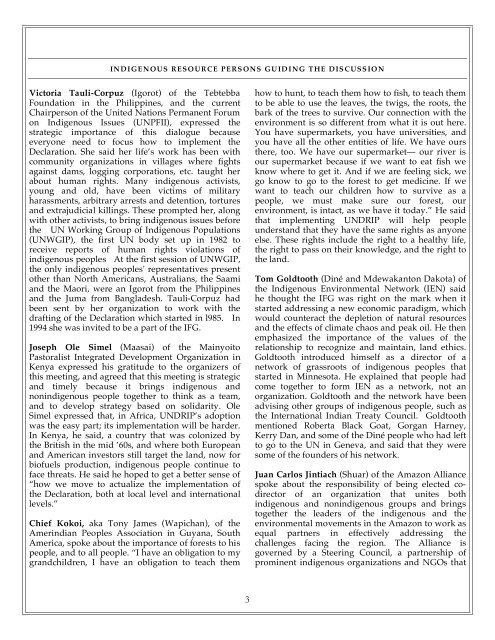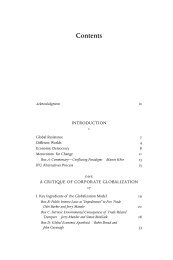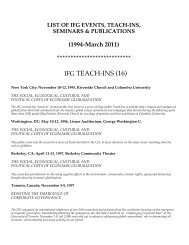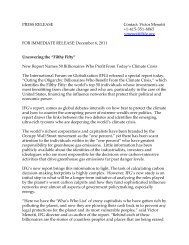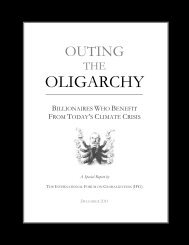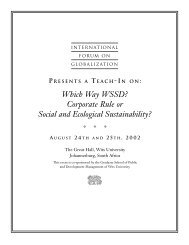UNDRIP Report - English FINAL - International Forum on Globalization
UNDRIP Report - English FINAL - International Forum on Globalization
UNDRIP Report - English FINAL - International Forum on Globalization
Create successful ePaper yourself
Turn your PDF publications into a flip-book with our unique Google optimized e-Paper software.
IN DI GEN OUS RESO URCE PERS ONS GU ID I NG THE DIS CUSS IO N<br />
Victoria Tauli-Corpuz (Igorot) of the Tebtebba<br />
Foundati<strong>on</strong> in the Philippines, and the current<br />
Chairpers<strong>on</strong> of the United Nati<strong>on</strong>s Permanent <str<strong>on</strong>g>Forum</str<strong>on</strong>g><br />
<strong>on</strong> Indigenous Issues (UNPFII), expressed the<br />
strategic importance of this dialogue because<br />
every<strong>on</strong>e need to focus how to implement the<br />
Declarati<strong>on</strong>. She said her life’s work has been with<br />
community organizati<strong>on</strong>s in villages where fights<br />
against dams, logging corporati<strong>on</strong>s, etc. taught her<br />
about human rights. Many indigenous activists,<br />
young and old, have been victims of military<br />
harassments, arbitrary arrests and detenti<strong>on</strong>, tortures<br />
and extrajudicial killings. These prompted her, al<strong>on</strong>g<br />
with other activists, to bring indigenous issues before<br />
the UN Working Group of Indigenous Populati<strong>on</strong>s<br />
(UNWGIP), the first UN body set up in 1982 to<br />
receive reports of human rights violati<strong>on</strong>s of<br />
indigenous peoples At the first sessi<strong>on</strong> of UNWGIP,<br />
the <strong>on</strong>ly indigenous peoples' representatives present<br />
other than North Americans, Australians, the Saami<br />
and the Maori, were an Igorot from the Philippines<br />
and the Juma from Bangladesh. Tauli-Corpuz had<br />
been sent by her organizati<strong>on</strong> to work with the<br />
drafting of the Declarati<strong>on</strong> which started in l985. In<br />
1994 she was invited to be a part of the IFG.<br />
Joseph Ole Simel (Maasai) of the Mainyoito<br />
Pastoralist Integrated Development Organizati<strong>on</strong> in<br />
Kenya expressed his gratitude to the organizers of<br />
this meeting, and agreed that this meeting is strategic<br />
and timely because it brings indigenous and<br />
n<strong>on</strong>indigenous people together to think as a team,<br />
and to develop strategy based <strong>on</strong> solidarity. Ole<br />
Simel expressed that, in Africa, <str<strong>on</strong>g>UNDRIP</str<strong>on</strong>g>’s adopti<strong>on</strong><br />
was the easy part; its implementati<strong>on</strong> will be harder.<br />
In Kenya, he said, a country that was col<strong>on</strong>ized by<br />
the British in the mid ’60s, and where both European<br />
and American investors still target the land, now for<br />
biofuels producti<strong>on</strong>, indigenous people c<strong>on</strong>tinue to<br />
face threats. He said he hoped to get a better sense of<br />
“how we move to actualize the implementati<strong>on</strong> of<br />
the Declarati<strong>on</strong>, both at local level and internati<strong>on</strong>al<br />
levels.”<br />
Chief Kokoi, aka T<strong>on</strong>y James (Wapichan), of the<br />
Amerindian Peoples Associati<strong>on</strong> in Guyana, South<br />
America, spoke about the importance of forests to his<br />
people, and to all people. “I have an obligati<strong>on</strong> to my<br />
grandchildren, I have an obligati<strong>on</strong> to teach them<br />
how to hunt, to teach them how to fish, to teach them<br />
to be able to use the leaves, the twigs, the roots, the<br />
bark of the trees to survive. Our c<strong>on</strong>necti<strong>on</strong> with the<br />
envir<strong>on</strong>ment is so different from what it is out here.<br />
You have supermarkets, you have universities, and<br />
you have all the other entities of life. We have ours<br />
there, too. We have our supermarket— our river is<br />
our supermarket because if we want to eat fish we<br />
know where to get it. And if we are feeling sick, we<br />
go know to go to the forest to get medicine. If we<br />
want to teach our children how to survive as a<br />
people, we must make sure our forest, our<br />
envir<strong>on</strong>ment, is intact, as we have it today.” He said<br />
that implementing <str<strong>on</strong>g>UNDRIP</str<strong>on</strong>g> will help people<br />
understand that they have the same rights as any<strong>on</strong>e<br />
else. These rights include the right to a healthy life,<br />
the right to pass <strong>on</strong> their knowledge, and the right to<br />
the land.<br />
Tom Goldtooth (Diné and Mdewakant<strong>on</strong> Dakota) of<br />
the Indigenous Envir<strong>on</strong>mental Network (IEN) said<br />
he thought the IFG was right <strong>on</strong> the mark when it<br />
started addressing a new ec<strong>on</strong>omic paradigm, which<br />
would counteract the depleti<strong>on</strong> of natural resources<br />
and the effects of climate chaos and peak oil. He then<br />
emphasized the importance of the values of the<br />
relati<strong>on</strong>ship to recognize and maintain, land ethics.<br />
Goldtooth introduced himself as a director of a<br />
network of grassroots of indigenous peoples that<br />
started in Minnesota. He explained that people had<br />
come together to form IEN as a network, not an<br />
organizati<strong>on</strong>. Goldtooth and the network have been<br />
advising other groups of indigenous people, such as<br />
the <str<strong>on</strong>g>Internati<strong>on</strong>al</str<strong>on</strong>g> Indian Treaty Council. Goldtooth<br />
menti<strong>on</strong>ed Roberta Black Goat, Gorgan Harney,<br />
Kerry Dan, and some of the Diné people who had left<br />
to go to the UN in Geneva, and said that they were<br />
some of the founders of his network.<br />
Juan Carlos Jintiach (Shuar) of the Amaz<strong>on</strong> Alliance<br />
spoke about the resp<strong>on</strong>sibility of being elected codirector<br />
of an organizati<strong>on</strong> that unites both<br />
indigenous and n<strong>on</strong>indigenous groups and brings<br />
together the leaders of the indigenous and the<br />
envir<strong>on</strong>mental movements in the Amaz<strong>on</strong> to work as<br />
equal partners in effectively addressing the<br />
challenges facing the regi<strong>on</strong>. The Alliance is<br />
governed by a Steering Council, a partnership of<br />
prominent indigenous organizati<strong>on</strong>s and NGOs that<br />
3


